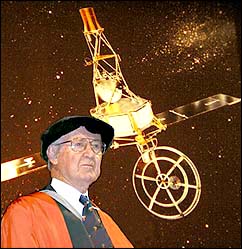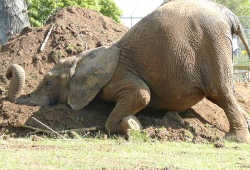Reprinted from the University of Canterbury’s Chronicle – 07/05/03
In 1928 a young student named William Pickering began his academic studies at what was then Canterbury College.
Seventy five years later the internationally renowned space engineer returned to the University of Canterbury to be awarded an Honorary Doctorate of Engineering.
The doctorate was conferred on the 92-year-old at a special graduation ceremony in the Christchurch Town Hall on 18 March. More than 1500 people of all ages turned out to see Dr Pickering honoured and to listen to his personal account of a lifetime in unmanned space research. His informative and inspiring 40-minute address earned him a standing ovation.
Dr Pickering led America’s deep space research and was a central figure in the space race between the US and Russia in the 60s and 70s. As director of the Jet Propulsion Laboratory in Pasadena, California, Dr Pickering led the development of space probes, including the first United States satellite, Explorer I. He also oversaw the first successful American around-the-moon probe, Pioneer IV, the Mariner flights to Venus and Mars in the 1960s, the Ranger photographic missions to the moon and the Surveyor lunar landings of 1966-67.
 |
| Dr William Pickering highlights a lifetime in unmanned space research Click here for a larger version |
Over the decades Dr Pickering has received many accolades and has twice graced the cover of Time magazine.
“Over the years I have received honours from various organisations in several countries but there’s something very special about being honoured in one’s original home,” he said.
“My first experience of university life was here and the experience stood me in good stead for the California Institute of Technology. This is a privately run, very select institution with the highest standards and they admitted me as a student based on my work here in Christchurch.”
Dr Pickering said he always expected to return to New Zealand to work in the developing electrical power business but jobs were hard to come by in the 1930s so he accepted a teaching position at CalTec.
“I had no thought that this position would develop into space projects. At that time no-one except a few wild-eyed science fiction fans had any idea that space exploration would happen.”
As the space programme developed, Dr Pickering was handed the perfect job spec. “I had a charter that basically said ‘go out and explore the solar system’.”
Dr Pickering treated the audience to a quick tour of the solar system, illustrated with photographs of the planets and the various space craft used in interplanetary travel.
“The space business has been exciting and very interesting. It has produced as many new questions as it has solved old questions. Furthermore it looks as if there is a lot more work to be done.”
Chancellor Dr Robin Mann quoted from a recent magazine article which described Dr Pickering as “New Zealand’s greatest gift to America”. He said Dr Pickering was an outstanding New Zealander and it was a “rare pleasure and a privilege” to pay tribute to one of the country’s “famous sons”.
Vice-Chancellor Professor Roy Sharp said Dr Pickering’s respect for science and engineering and his commitment to furthering knowledge through scientific research was inspirational.
“I found it an inspirational message not just of man’s exploration of space and technological achievements but also inspirational for what an ordinary New Zealander can achieve on the world stage.”
Professor Sutherland delivers Pickering citation
The oration for Dr William Pickering was given by the Dean of Engineering, Associate Professor Alex Sutherland, at a special graduation ceremony at the Christchurch Town Hall on March 18. The following are excerpts from his speech.
|
|
| Dean of Engineering, Associate Professor Alex Sutherland delivers the oration for Dr William Pickering. |
“It was in 1956 that the British Astronomer Royal Sir Richard Wooley said ‘Space Travel is Utter Bilge’. It was only five years later in 1961 that The Times of London in commenting on the world’s first manned space flight reported ‘Yuri Gagarin has been launched into ‘utter bilge’. Such was the rapidity with which the exploration of space became a reality. “Some present will remember the launch of the Russian space craft, Sputnik, in October 1957. This launch and the launch of a second Sputnik one month later was the trigger for the United States to enter what became known as the ‘space race’. After the remarkably short time of three months, on 31 January 1958, the Explorer I Satellite was successfully launched by a team led by Dr William Pickering. “Dr Pickering was born in Wellington. At the age of six he went, following the death of this mother, to live with his grandparents in Havelock in the Marlborough Sounds. He attended Havelock Primary School, the same primary school that Ernest Rutherford attended. “From high school he came to Canterbury to study engineering and successfully completed the Engineering Intermediate year. I know Dr Pickering you were successful because thanks to the University’s assiduous record keeping I have a copy of your examination results for the year 1928 which I now present to you. “Dr Pickering’s record notes ‘Engineering Entrance transferred to the Institute of Technology, Pasadena, California’. It was there, at Caltech as it became known, that he completed his Bachelor Degree in Electrical Engineering in 1932, a Masters Degree in 1933 and a PhD in Physics in 1936. He then joined the Faculty at Caltech becoming, in 1946, Professor of Electrical Engineering. “It was his studies of radio telemetry that led to an association with Caltech’s Jet Propulsion Laboratory. Here he adapted his frequency modulated telemetry system for use in transmitting data from high altitude sounding rockets. “In 1954 he became the laboratory’s director. Here I quote from one of the many websites which refer to Dr Pickering; ‘His role of director was a multifaceted one: not only was his scientific and technical expertise to the fore, but his antipodean diplomacy was required to lead not only volatile and brilliant scientists, but also work with politicians and military hierarchy during the pressure-cooker political environment of the Cold War.” “During the International Geophysical Year of 1955 the world’s scientific community set the objective of placing satellites in earth orbit for the purposes of gathering scientific data. As director of the Jet Propulsion Laboratory, Dr Pickering led a team whose task it was to develop a suitable rocket. “It was this team that responded to the challenge of Sputnik by successfully launching the satellite Explorer I. Dr Pickering gave an assurance to then President Eisenhower that the Jet Propulsion Laboratory team could match the Sputnik achievement in three months. Explorer 1 did that and stayed in orbit for 10 years making many important scientific discoveries including the Van Allen radiation belts. “In 1958 the US Congress established the National Aeronautics and Space Administration and effectively took over the Jet Propulsion Laboratory with Dr Pickering as its head. In Dr Pickering’s words he ‘was delighted to hold a contract that said in essence ‘go out and explore the depths of the solar system’. “This he did with great success. In the early 60s the Mariner space probes provided significant ‘firsts’ for the American programme. Mariner II went to Venus in 1962 and Dr Pickering as leader of the project appeared on the cover of Time magazine of March 8, 1963. “On 28 November 1964, Mariner IV was launched towards Mars. It travelled 520 million kilometres in 228 days and successfully sent back excellent pictures of the Martian surface. Again Dr Pickering appeared on Time magazine’s cover. “There were also the Ranger, Surveyor and Viking space vehicles which returned high resolution photographs of the surface of the Moon, Venus, Mars and Mercury. With the exception of Pluto, all planets in the Solar system were visited. “The 1960s were the decade of President Kennedy’s declaration that by the end of the decade a man would walk on the moon. Dr Pickering was one of the engineers who, through his engineering and leadership skills, brought President Kennedy’s declaration to fruition. He rates as one of his major achievements the Ranger VII spacecraft that returned detailed pictures of the moon’s surface which were so important in planning for Neil Armstrong’s moon walk. “Dr Pickering retired from the Jet Propulsion Laboratory in 1976. His achievements there have been recognised in many ways – too numerous to list in detail. I will refer to a few. He received an honorary knighthood from the Queen in 1976, and in 1964 the Japan Prize from His Majesty the Emperor of Japan. He has personal messages from five United States Presidents, and in 1976 he received from President Ford the prestigious President of the United States National Medal of Science. “Throughout this distinguished career, Dr Pickering had a continuing interest in New Zealand and in particular in New Zealand students who went to Caltech. “In 1995 Dr Pickering was instrumental in establishing the W.H. Pickering Fellowship which provides funding for a New Zealand student to undertake graduate study at Caltech. “The University is proud to be able to honour one of New Zealand’s great engineer/scientists. “In closing, I quote from the 1993 Caltech President’s address as he presented the Francois-Xavier Baguoud Aerospace Prize to Dr Pickering. ‘More than any other individual, Bill Pickering was responsible for America’s success in exploring the planets – an endeavour that demanded vision, courage, dedication, expertise and the ability to inspire two generations of scientists and engineers at the Jet Propulsion Laboratory.” “Chancellor, I have the honour to present William Hayward Pickering for the award of the degree Doctor of Engineering (honoris causa).” Caption: Dean of Engineering, Associate Professor Alex Sutherland delivers the oration for Dr William Pickering.





